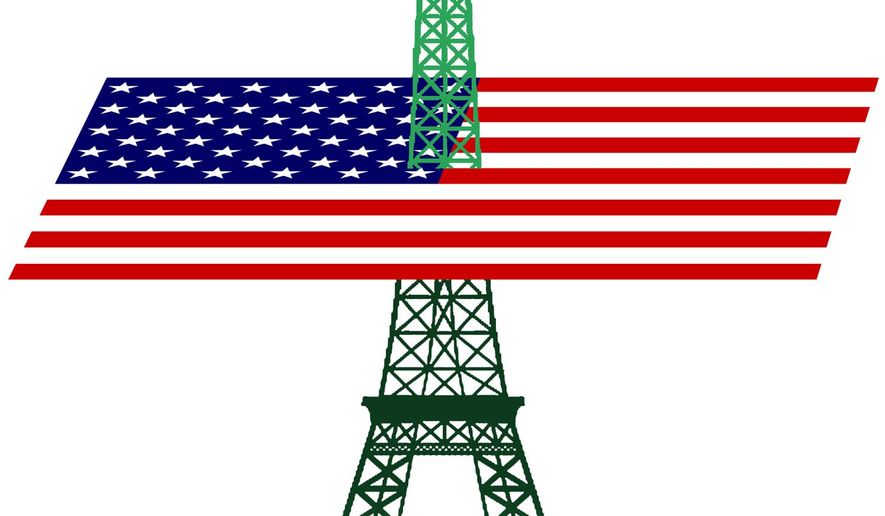OPINION:
It’s time for the United States to pull out of the Paris climate agreement entirely.
On Tuesday, President Trump signed an executive order that promoted American energy security by rolling back several overreaching Obama-era regulations that are central to the Paris climate pact.
The president’s order addressed some of the most economically damaging regulations behind the Paris accords.
The executive order’s goals include reversing the so-called “Clean Power” rules that would shutter American power plants. It also rescinds the damaging moratorium on coal leasing. Additionally, it removes the requirement that federal officials consider climate change when making decisions.
All were put in place without congressional approval.
This executive order sent Washington’s regulatory agencies back to the drawing board to help make American energy as clean as we can, as fast as we can, without raising costs on American families.
The order has taken the legs out from under the Paris climate agreement that President Obama signed in his last year in office.
The international climate deal was negotiated badly and signed out of desperation. In fact, there was enough bipartisan opposition to the pact that Mr. Obama bypassed sending it to the Senate for ratification as a treaty. The agreement rests on little more than the former president’s handshake.
The Paris deal imposed on the United States unrealistic targets for reducing our carbon emissions. It set America’s standards higher than for much of the world, while giving countries like China a free pass for years to come.
We all want a cleaner environment, but the Paris agreement, and the ill-conceived regulations that it spawned, disproportionately harm America’s economy and put us at a competitive disadvantage.
According to National Economic Research Associates Economic Consulting, if the United States met all of its commitments as part of the Paris climate accord, it would cost the American economy $3 trillion and 6.5 million industrial sector jobs by 2040.
This bad deal for America is based on the faulty premise that the United States is the primary culprit of a changing climate rather than a driver of innovative solutions.
America has already reduced its carbon-dioxide emissions dramatically. According to the Energy Information Administration, emissions have dropped 12 percent in the past decade.
The trend line is clear. We can reduce our emissions without the Paris accords.
The U.S. reduction in carbon emissions is not because of government regulations or international agreements. It is in large part because of new and innovative technologies from the private sector, including innovations in natural gas production.
While the climate deal punishes America’s energy producers with expensive and burdensome regulations, it gives other countries much more generous limits and timelines.
The Paris agreement is a great deal for countries like China and India. They were understandably eager to take full advantage of the chance to get an economic leg up on the United States in terms of energy security. With an abundance of low-cost coal, these nations will put our manufacturers at a competitive disadvantage.
Similarly, with less American oil and natural gas production, OPEC countries and Russia would have greater leverage in global energy markets.
The Paris agreement also created a United Nations climate slush fund, largely underwritten by American taxpayers. In his final year in office, President Obama contributed $500 million from the State Department to this fund on two separate occasions. He did it without authorization from Congress.
Other countries are now questioning their own financial commitments to the agreement. Finance ministers from multiple G20 countries are actively seeking to scale back their government’s pledges to finance the deal.
This agreement is not the solution. According to researchers from MIT, even if every nation that signed on to the Paris pact met all of their commitments until the end of the century; the impact on the climate would be negligible.
Bottom line: the Paris climate agreement is a bad deal for America.
Pulling out of this agreement would help rev the engines of America’s economy, which is necessary if we are going to develop the next generation of technologies to reduce our emissions even further.
It would also get rid of an unnecessary distraction for the State Department. America faces challenges around the world that are more pressing than the Paris accord.
We would be better off if our diplomats focused on security threats like those we face from North Korea, Russia and ISIS, instead of trying to justify remaining in a bad deal with which we do not intend to comply.
In November, President Trump and Republicans in Congress were given a mandate to put this country’s needs first. Walking away from a bad Paris deal would be a good start.
• John Barrasso, a Republican member of the U.S. Senate from Wyoming, is chairman of the Senate Committee on Environment and Public Works and a member of the Foreign Affairs Committee.




Please read our comment policy before commenting.